Europe's big fear has been that Donald Trump would return to the White House, cozy up to Vladimir Putin and throw Ukraine under a bus.
The signs were there. Mr Trump had made no secret of his admiration for the Russian president, going so far as to trust his word over that of the US intelligence services at the Helsinki summit in 2018.
Ukraine was a drain on US resources, he and his supporters argued. He boasted he could end the war in a day, a brag that suggested a quick deal favourable to the Kremlin, over the heads of Ukraine and Europe.
On Wednesday night, those fears seemed to be realised.
Donald Trump revealed on Truth Social that he’d shared a long, great-minds-think-alike phone call with Mr Putin, reflecting "on the Great History of our Nations, …the strengths of our respective Nations, and the great benefit that we will someday have in working together".
US and Russian teams would start negotiations immediately; Mr Trump called Ukrainian President Volodymyr Zelensky, but only after he'd spoken to Mr Putin.
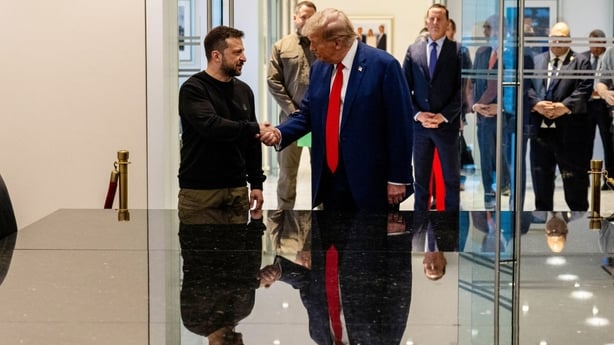
Simultaneously, at the Ukraine Defence Contact Group meeting in Brussels, Mr Trump’s defence secretary Pete Hegseth said Ukraine would not be joining NATO and that Ukraine could not expect to hold on to Crimea, seized by Russia in 2014.
There was immediate alarm in European capitals.
In Paris, the foreign ministers of Germany, France, Spain, Italy, Poland and the UK - as well as Kaja Kallas, the EU’s foreign policy chief - demanded that Ukraine and Europe be part of any negotiations, and Kyiv be given "strong security guarantees".
Within 48 hours the West’s collective response to Russia’s brutal invasion of Ukraine had been upended. Mr Putin, regarded as a war criminal by most European capitals, was embraced by the US president, who appeared to have handed him two sizeable concessions even before negotiations had begun.
Yet, there were conflicting signals.
Pete Hegseth talked about a "prosperous" and "sovereign" Ukraine; Scott Bessant, the treasury secretary was in Kyiv referring to a "security shield" in return for some $500 billion in Ukrainian minerals and rare earths.
On Thursday night, US Secretary of State Marco Rubio "underlined [the United States’] commitment to Ukraine’s independence" in a phone call with his Ukrainian counterpart, according to the State Department.
Yet, Trumpist complaints that Europe had to do more were now reaching a tipping point.
At the NATO meeting, Hegseth acknowledged that the Russian "war machine" was bent on grabbing more Ukrainian land, but "standing up against that is an important European responsibility," he said.
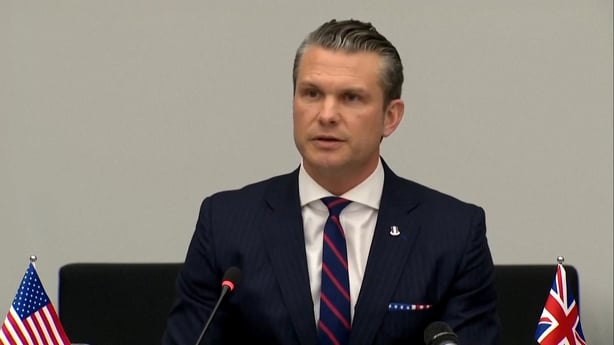
Europe has been factoring in Mr Trump’s return to the White House for at least a year, and there has been an intense debate about how the EU might fill the military, economic and diplomatic vacuum on Ukraine if he disengaged from NATO or made overtures to Vladimir Putin.
Since Russia’s full scale invasion in 2022, member states have steadily increased defence spending to both replenish weapons given to Ukraine and to strengthen Europe’s own defences.
The EU has drawn closer to NATO; the alliance’s core responsibility is defence planning and identifying capability gaps - air defences, ammunition, drones - but the EU is focusing on paying for those capabilities, or at least developing an industrial strategy that can allow the weaponry to be produced more cheaply and at scale.
A European Commission White Paper in March will address a multiplicity of issues, from a defence industrial strategy to the interoperability of weapons systems to how it should all be paid for.
Europe has also been pushing back on the Trump narrative that the US has spent more on Ukraine than the EU.
Since February 2022 member states have provided nearly €100 billion in military, financial, and humanitarian support compared with €80.5 billion from the United States (Europe has also spent €20 billion on refugee assistance).
There were hopes that Donald Trump might take a tougher approach to Mr Putin. A swift Russian victory in Ukraine that might follow a withdrawal of US support would saddle Mr Trump with the kind of legacy Joe Biden endured following the disastrous exit from Afghanistan.
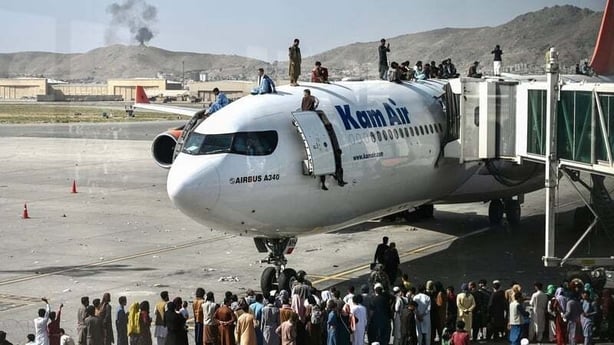
Despite Russian gains on the battlefield in 2024, there were indications that prolonged Western sanctions were starting to take effect. The Russian economy is suffering from high inflation and interest rates, a weakening ruble and acute labour shortages.
This was a perfect opportunity for Mr Trump to ramp up pressure on Mr Putin, according to the Center for European Policy Analysis (CEPA).
"Allies must present Moscow with the prospect of severe consequences should it continue its war course," CEPA said in a report ahead of this weekend’s Munich Security Conference.
"Now is the time for allies to exploit Russia’s vulnerabilities and apply maximum pressure through unwavering military support for Ukraine, economic sanctions on Russia, and tough diplomacy.
"Any alternative risks a protracted Afghanistan-like conflict that will cost the United States and its allies far more in blood and treasure."
'An easy way and a hard way'
There were some indications that Mr Trump might be thinking along these lines.
On 23 January, he warned Mr Putin there was "an easy way and a hard way" and that he would impose further sanctions if he didn’t agree to talks to end the war. Mr Trump has also kept existing sanctions in place.
Behind the scenes, EU diplomats have been struggling to adapt to a US administration that no longer feels like an ally and that has trashed the conventions of diplomacy.
Senior figures have said Europe’s response - both on Ukraine and trade tariffs - has been to remain united and not to respond to every flame thrown by the White House.
Officials acknowledge that the EU’s network of contacts in the State Department, the Pentagon, the National Security Council and the White House have either been replaced or left. Getting to the right person to assert Europe’s presence has been tricky.
One EU diplomat cautions that Europe should not panic every time Mr Trump makes what seems a reckless gamble.
"That fundamentally misreads the way Trump operates," says the diplomat.
"To expect that Trump would have dialed in the EU before doing this is utterly foolish. It’s not to say this isn’t problematic, but this fits the expectation of the way he operates. It's up to us to make sure that if and when conversations happen, we are at the table."
The mechanics of getting Europe around the table have yet to be figured out because Mr Trump is driving things at breakneck speed.
Diplomats say Europe will have to start making linkages between trade and security policy and to show some self-confidence when dealing with the US president to ensure that they make their voice heard.
Europe will also need to remind Mr Trump, with no doubt a degree of flattery, that if he wants a legacy as a peacemaker - and a dealmaker - then he cannot railroad Ukraine into a capitulation on Russian terms.
In an interview with the Wall Street Journal ahead of the Munich Security Conference, US Vice President JD Vance warned that Washington had economic and military leverage to encourage Mr Putin to the table (his spokesman later denied the US was making a military threat).
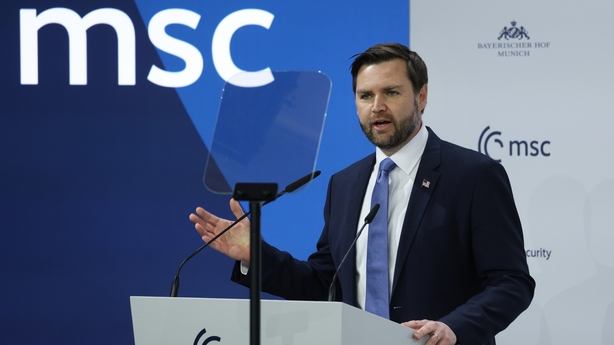
Treasury Secretary Scott Bessant also suggested further sanctions.
He told Fox News: "If we believe that taking the sanctions regime up to a maximum threshold level will help us achieve negotiating leverage - and as you know, no one understands negotiating leverage better than President Trump, so - that will be his decision, and Treasury will implement it."
There is, of course, the implied leverage against Ukraine as well, that Washington will withhold military support if President Zelensky does not sign up to a deal.
That would undoubtedly cause a major crisis within NATO, but it is certainly focusing minds on what the incentives are for both President Zelenksy and Mr Putin to make a deal, now that negotiations look to be taking shape, and how much the current battlefield realities will shape those negotiations.
Russia controls one fifth of Ukraine’s territory, including Crimea, parts of Donetsk, Kharkiv, Kherson, Luhansk, Mykolayiv and Zaporizhzhya Oblasts.
The Russian army, despite big setbacks in the late summer of 2022, made steady gains along the front line in 2024, including capturing strategic strongholds like Avdiivka, with military experts suggesting that those gains could accelerate in 2025.
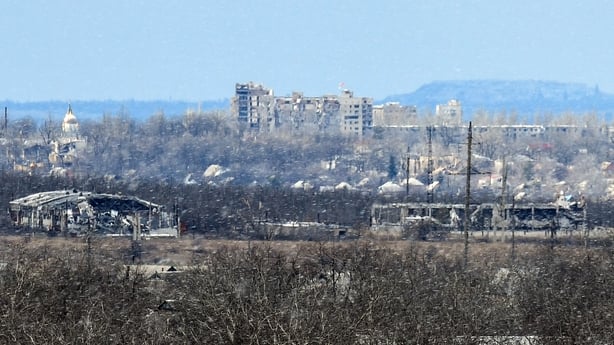
Moscow also intensified its airstrikes on civilian targets and energy infrastructure last year in order to wear down the morale of the Ukrainian population.
Russia’s gains at the front have come at a crushing cost in human lives, about which Mr Putin appears to care little (the military is recruiting 30,000 men a month). Despite steady gains, Russia has not attempted any major breakthrough using a combined arms operation.
By contrast, Ukraine has been suffering on the battlefield, and after three years its population is extraordinarily war weary.
Kyiv is doing a lot better in terms of ammunition and drones (Ukraine now manufactures some 30% of the drones it needs), offsetting Russia’s earlier advantage, but it is suffering from a lack of manpower, too few rotations of men at the front, and the mobilisation of fresh but inexperienced troops.
"Creating new brigades was really exacerbating the challenge," says Michael Kofman, a military analyst and co-presenter of the War on the Rocks podcast.
"They were taking newly mobilised people, and instead of replacing losses at the front, they were letting experienced brigades get attrited, then trying to create new brigades, which, for lack of a better word, were combat worthless."
However, if Ukraine can stabilise the front - say that President Trump seeks congressional support for another military aid package to that effect - then Kyiv would be in a relatively good position going into negotiations.
What incentive would Vladimir Putin have in making peace?
Very little, it appears.
The Russian president has turned his country into a war economy, pushed defence spending to 8% of GDP (the EU average is 1.3%), brought in thousands of North Korean troops (thus internationalising the conflict) and reshaped his foreign policy to antagonise the West at every turn.
His repressive power at home appears completely entrenched (the death in a plane crash in 2023 of mercenary leader Yvgenny Prigozhin, Mr Putin’s only serious rival since the war began, was a message to anyone thinking of unseating the Russian leader).
If Mr Putin is making incremental gains on the battlefield, and suspects that Mr Trump is minded to turn off military support, then he has even less incentive to make a deal (talking is not the same as negotiating, as one observer has noted).
Nor has Mr Putin publicly disavowed his war aims: the subjugation of Ukraine into a supine, client state and the destruction of the country’s history and culture. Since the Trump-Putin call, the Kremlin has spoken about "removing the causes of the conflict".
While Mr Putin’s foreign minister Sergei Lavrov revived one of those "causes" - following the alarm in European capitals over the phone call - when he accused the EU of "arming the very Nazi Kyiv regime to wage war against the Russian Federation," Putin’s broader (and more accurate) war aims are likely found in the ultimatum Russia issued in December 2021.
Mr Putin proposed two draft Russia-NATO treaties banning Ukraine, or any other eastern European country, from joining NATO, and proposing that the US pull NATO forces out of those countries who joined the alliance after 1997 (most of whom later joined the EU).
The proposals were dismissed as ludicrous by the West, but there is no indication that Mr Putin has dropped them completely, and Mr Trump’s ongoing noises about pulling out of NATO will no doubt have been music to his ears.
The Russian president has made no secret of his motivation: He sees Russia as a great power, robbed, by the failures of Bolshevism and the Western victory in the Cold War, of its right to subjugate its sphere of influence in a multipolar world.
Despite Mr Trump’s warm words about the Russian leader after his phone call, the paradox is that while Mr Putin wants to jointly deal with Ukraine, he sees in the United States a declining superpower that should remain the Kremlin’s adversary.
"The United States remains Russia’s principal opponent, not Ukraine," wrote Fiona Hill, Trump’s Russia expert in his first term, and Angela Stent of the Brookings Institution, in February 2023.
"Putin wants to negotiate directly with Washington to 'deliver’ Ukraine, with the end goal of getting the U.S. president to sign away the future of the country.
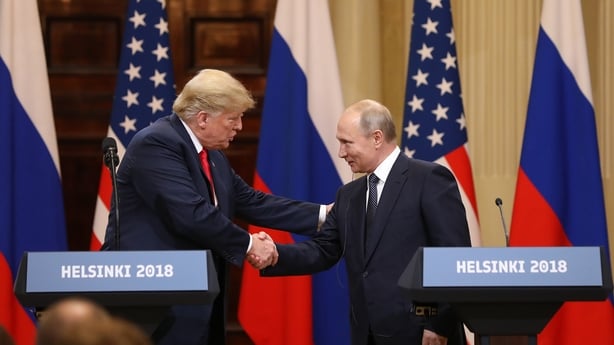
"He has no desire to meet directly with Ukrainian President Volodymyr Zelensky. His goal remains the kind of settlement achieved in 1945 at Yalta, when U.S. President Franklin Roosevelt and British Prime Minister Winston Churchill sat across the table from the Soviet leader Joseph Stalin and accepted Moscow’s post–World War II dominance of Eastern Europe without consulting the countries affected by these decisions."
EU capitals deeply distrustful of Putin's intentions
That is why EU capitals are deeply distrustful of Mr Putin’s intentions, and why security guarantees are so important for both Europe and Ukraine - Baltic states in particular have no doubt that Russia has designs on them once it’s done with Ukraine.
Mr Zelensky is under pressure to give up some occupied land as part of a deal; that would be an intensely bitter pill to swallow given the sacrifice Ukrainians have made and he will only agree to it in exchange for security guarantees that Mr Putin won’t bank a ceasefire and regroup.
For Ukraine, NATO membership is the cheapest and quickest guarantee, since its Article 5 obligation would deter likely Russia from attacking. Failing that, legally binding security guarantees by European member states, backed up by as many as 200,000 peacekeepers (according to Kyiv’s calculations), would be a second best option, with some US component indispensable.
The Trump administration appears to have dismissed Ukraine’s membership of NATO. The Secretary General Mark Rutte has pointed out that, even though the alliance declared at its Washington summit last summer that Ukraine could join if it fulfilled certain conditions, it was never promised as part of any negotiated settlement.
That will weigh heavily on Kyiv if and when negotiations get underway.
Weighing even more heavily will be the prospect of Russia holding on to Ukrainian territory, not only because it is a naked land grab, but because the reign of terror imposed by Moscow, and the enforced and brutal Russification of conquered communities - who have relations in unoccupied Ukraine - allows the Kremlin to keep the pressure on Ukraine cost-free.
"As many Ukrainians recognize," writes Nataliya Gemunyuk, CEO of The Public Interest Journalism Lab, and co-founder of The Reckoning Project in Foreign Affairs, "what observers in the West have characterized as brutal excesses in occupied areas - human rights abuses, political repression, and war crimes - are in fact a central part of Russia’s war strategy.
"The issue is not merely what happens to those under Russian rule but how Moscow has used its control of significant numbers of Ukrainians to undermine the stability of the whole country, even without taking more territory."
At the sharp end, Ukrainians in occupied territories are subject to executions, torture, imprisonment, the eradication of Ukrainian books and libraries, and the suppression of the language, according to numerous reports, as Moscow continues to impose its colonisation by force.
Ukraine estimates that between 2012 and 2022 some 800,000 Russians were settled in Crimea, against international law.
Politically, Mr Zelensky may be able to sell the idea of Ukrainian territories remaining in Russian hands temporarily, in the same way that east Germany was eventually reunited with west Germany at the end of the Cold War.
The difference is, the Soviet Union did not attempt to erase the Germanness of the citizens of the GDR. That is the dark mission of Vladimir Putin in the lands he has conquered, and which he will undoubtedly refuse to relinquish.
How tough will the dealmaker Donald Trump be then?







